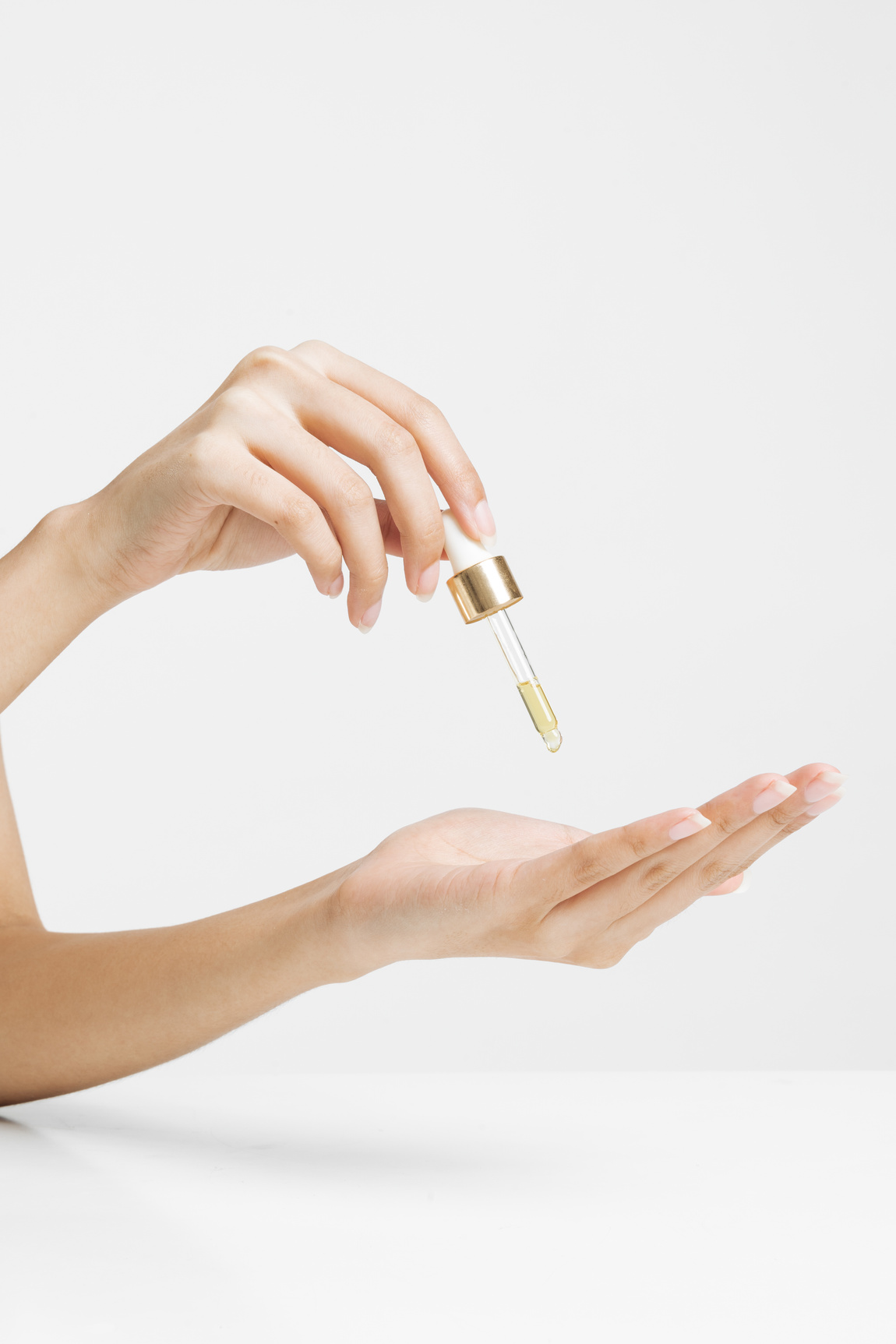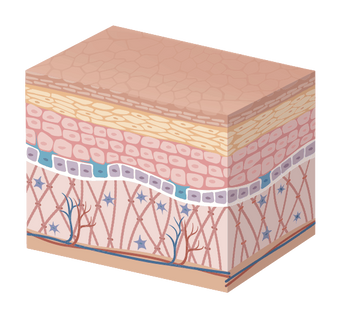vytrus magazine
Vitamin D and neurochemicals
Crossing frontiers in skin care

Vitamins are one of the trendy key players in the latest skin care product launches. The rise of topical cosmetics that boost vitamin C is of high importance, as well as other vitamins like A, B, E, F, amongst others widely implemented in today’s cosmetic formulations.
What if we considered the vitamin D - the sun vitamin - in our next vitamin range of products?
DID YOU KNOW THAT...?
- Up to 90% of vitamin D is produced from the sunshine exposure of skin.
- The skin has the unique metabolic capacity to produce the active form of vitamin D.
- The skin is the only tissue where vitamin D is produced and used.


Vitamin D
Vitamin D has a transversal effect on our organism and on our skin. Stimulating the synthesis of vitamin D means promoting the skin health which leads to a greater beauty of the skin. From Vytrus’ point of view, beauty is a consequence of health and not the other way around.
Exploring new cosmetic horizons for this vitamin that comes from the sun has allowed us to discover its multiple benefits at the skin level and give it a relevant role in skin care. Amongst its dermal functions, the following stand out:
IMMUNOPROTECTIVE. It affects the immune response
The active vitamin D produced in the skin is actively involved in the innate and acquired immunity of the skin and in the inflammatory response of the skin to actinic damage. It has an immunomodulatory effect on the keratinocyte and regulates proliferation and differentiation in early stages.
ANTIMICROBIAL. Modulation of antimicrobial peptides
Vitamin D is also involved in the regulation of antimicrobial peptides, especially in the promotion of cathelicidin and defensin ß.
BOOSTER OF HEALTHY AGEING
The vitamin D endocrine system (VDES) is also known to regulate ageing in many tissues including the skin. The aging of the skin promoted by UV radiation can be inhibited through the induction of skin synthesis of vitamin D. In addition, it helps to maintain healthy blood microcirculation, by providing vasoprotective effects, inhibiting pro-inflammatory activities and promoting antioxidant defenses.
PHOTOPROTECTIVE. Fighting against the formation of dimers and other photoproducts
Vitamin D has been shown to be crucial in the intrinsic response to ultraviolet radiation damage to skin cells. In different experimental models on human keratinocytes, it has been possible to demonstrate a photoprotective effect of calcitriol, an active metabolite from vitamin D, against the production of pyrimidine dimers and a significant decrease in other photoproducts induced by UV radiation.

PROTECTIVE AND MOISTURIZING. Maintenance of the epidermal barrier
Vitamin D deficiency is related to epidermal barrier dysfunction. Vitamin D increases the expression of involucrin, transglutaminase, loricrin and filaggrin, increasing the production and development of cornification in addition to regulating the processing of glycosylceramide chains. Subjects with low levels of vitamin D have drier skin, with lower water content. The alteration of the epidermal barrier not only allows the entry of allergens, but also triggers the activation of Langerhans cells and facilitates the binding of antigens to these cells through the damaged barrier.
What if we could stimulate the optimal synthesis of vitamin D in the skin from cosmetics?
Once again, nature gives us the answer and advanced biotechnology is the sustainable way to efficiently work with plants to obtain their hidden power.


A STORY INSPIRED BY NATURE.
A NEW MATCH IN COSMETICS
Plants have turned into a powerful source of inspiration for the cosmetic industry. Since its origin, Vytrus gave a step forward and focused its attention on a specific platform to develop active ingredients: plant stem cell cultures.
The plant stem cell (or totipotent cell) is the basic unit of plant life. From a single stem cell, a complete plant can be regenerated as the stem cell contains all the potential of the plant whose properties can be applied to skin and hair care. Biotechnology enables us to obtain this whole potential to create natural active ingredients based on cutting-edge technology, science and nature.

Lithops pseudotruncatella
By researching into the plant world, Vytrus found a really interesting plant called Lithops. This extremophilic plant, also called ‘Living Stones’, is native to the deserts of Southern Africa. Lithops is able to live up to 95 years and Vytrus named it as ‘botanical engineer’ because it is specialized in the management of space, water and light in very extreme dry conditions.
Due to living in desertic environments, Lithops has developed an ability to perform an underground photosynthesis. They camouflage themselves with the environment to protect against predators and regulate hydration and turgor by anti-stress mechanisms and resistance to water deficit.
The plant has developed an incredible strategy of adaptation to its environment, being able to optimize photosynthetic processes while minimizing the loss of trans-epidermal water in extreme habitats.


What is the mystery behind the story?

Bioinspiration – going beyond boundaries
Lithops is able to maintain those levels of water and healthy cells during extreme periods. Its secret weapon is its sugar structuration. Along with a peculiar metabolism, this sugar structuration enables the plant to capture the light necessary for the underground photosynthesis without compromising the water balance of the plant.
Based in the exceptional physiological behavior of the plant, Vytrus saw significant analogies between how Lithops performs the underground photosynthesis and what is required for the synthesis of vitamin D in human skin. In both cases, a well-structured tissue is required to interact with the sunlight in an optimal way while maximal hydration levels are need.
Focusing its attention on its capacities and inspired by a wonderful plant mechanism, Vytrus found out a route to stimulate our skin and help produce vitamin D topically.

By developing a biotechnology platform called Phyto-Glucidic Fractions based on sugars, Vytrus was able to create Nectaria Lithops™. The biophysical mechanism of action of this active ingredient, made from Lithops stem cells, consists of the optimization of the skin microenvironment to stimulate the vitamin D production by the cutaneous cells.
This innovative approach is based on improving the cutaneous structure, creating an adequate structural space for the vitamin D production while boosting deep water reserves. This is possible thanks to the Lithops cell culture, rich in biomimetic glycocalyx-derived glycoconjugates (sugars), organic acids, and polyphenols. This synergy allows to protect and repair the glycocalyx of epidermal cells to achieve optimal structure and functionality. Optimized vitamin D levels result in a dewy, radiant, plumped and deeply hydrated D-Skin.
A Cell Nectar for a D-Skin
THE CONCEPT OF D-SKIN,
A UNIQUE CELL NECTAR
Vytrus has studied the vitamin D biosynthesis and discovered a new cosmetic approach to its production: the optimization of the skin endogenous environment. Although there are still many aspects to explore, Vytrus has seen that it is possible to optimize the synthesis of vitamin D topically by promoting a favorable skin microenvironment.
What does Nectaria Lithops™ do?

Through the optimization of the skin microenvironment, the efficiency of vitamin D synthesis is increased preventing the generation of inactive by-products while boosting Lumisterol as a key vitamin D reservoir.
Through a biophysical mechanism of action, Nectaria Lithops™ optimizes the skin microenvironment by working on four axes:
Strong structural organization of cell membranes
A fully functional and well-structured cell membrane is essential for an optimized vitamin D synthesis.
Optimizing light use
Modulating the optical properties of the skin.
Enhancing deep skin hydration
Vitamin D synthesis requires a good water level which modulates the polarity of the medium.
Optimizing vitamin D synthesis
Instead of increasing vitamin D levels topically in excess, the mechanism helps the skin regulate and normalize its own vitamin D levels.
Vytrus Biotech proposes a new concept that rises both the skin and the vitamin D at the same level
THE D-SKIN
A Dewy skin
A D-lighted skin
A vitamin D enriched skin
A skin Deep-layer hydration
A healthy Sun care with a D-approach
How is the skin benefited from being vitamin D-enriched?
Optimized vitamin D levels imply multiple benefits for our health.
Based on the power of nature and biotechnology, it has been possible to create Nectaria Lithops™, a 100% natural active that brings special plant molecules to skin care. Its biophysical mechanism of action helps our skin optimize its levels of vitamin D and open a new paradigm in the treatment of the skin from a cosmetic point of view.

By having a skin optimally enriched in vitamin D, several and interesting properties positively impact on our skin health:
- More structured and regenerated skin
- Hydration of the deepest layers of the skin (1mm depth)
- Skin dewiness increase (more luminosity and less oiliness)
- Enhancement of skin tone and texture
- Mattifying and perfectioning effect of the skin
- Dermal filler-like effect (increase of cheek volume)
- Increase the water retention capacity of the skin
- Improvement of skin oxygenation and microcirculation
- A vitamin D enriched skin while being sun-protected
- Volumize, plump, glow, and revitalize

When it comes to cosmetic applications for skin care, a plant-based active that enables brands and manufacturers to elaborate formulations to stimulate the vitamin D synthesis on the skin opens up multiple opportunities to satisfy consumers’ demands. A new D-Skin concept that turns into a world of possibilities:
- Moisturizing, skin densifying & structuring, dry/very dry skin formulations & dermal filling applications
- Volumizing and plumping, brightening and luminosity enhancing formulations
- Radiance and glow treatments
- Sun protection and vitamin D enrichment and after sun repairing formulations
- Tone and texture evening treatments, well-ageing & antioxidant products
- Skin revitalizing and conditioning formulations
A WORLD OF NEUROCHEMICALS. NEW SYNERGIES IN SKIN CARE
Vitamins are a hype in the cosmetic industry and are used in personal care formulations due to their multiple benefits, let's discover them.
Vitamin A
Anti-wrinkles, firmness, anti-acne, antioxidant, wound healing
Skin barrier function protection, wound healing, photoprotection, anti-acne, regeneration
Vitamin C
Antioxidant effect, brightening, hydration, wrinkle reduction
Vitamin D
Has always been a challenge in cosmetics that can be overcome from biotechnology.

Vitamin E
Anti-inflammatory, hydration, antioxidant, protection against cellular oxidation
Vitamin F
Skin barrier restoring, redness reduction, luminosity, hydration, skin regeneration
How do we deal with the cosmetics boundaries?

Nectaria Lithops ™ enters in the cosmetic scenario and opens a door to stimulate the synthesis of vitamin D in the skin by bringing beneficial plant molecules that add up multiple benefits for our skin health.
By working with unique plant stem cell cultures, it is possible to stimulate vitamin D synthesis topically through a biophysical approach. A great complement to any range of vitamin products in cosmetics that crosses traditional frontiers in the sector and rises the standard of how cosmetic companies can face the care of the skin by including new options in their formulations.
Vytrus proposal is to make a step forward in cosmetic innovation and help brands create formulations with synergistic effects by combining vitamin D stimulators and other vitamins of wider use in cosmetics. While those vitamins can be topically applied in cosmetics, vitamin D has been a challenge for the cosmetic industry given the fact that vitamin D cannot be directly applied to the skin. This barrier has been overcome by Vytrus thanks to the possibilities of biotechnology and the properties of the succulent plant Lithops.
Vitamins are OK. What about other strategies in the skin biochemistry?
The skin biochemistry has lately been evolving and cosmetics are entering in more detail in new activation pathways derived to the secretion of active molecules in the skin.
The skin neuro-endocrine activity is regulated by several pathways and modulators:
- Hypothalamic-pituitary-adrenal axis
Cortisol, oxytocin, dopamine
- Serotoninergic system (serotonin)
- Opioid System (α-melanocortin, POMC)
- Catecholaminergic system (cortisol)
- Opioid system (β-endorphins)
- Cannabinoid System (CBD)
Local neuromodulators released by skin cells represent the replica of the messengers and regulation mechanisms of the central system.
According to these pathways, Vytrus proposes other synergies along with the new concept of D-Skin focusing its attention on some neurochemicals whose modulated behaviour brings beneficial effects to our skin health.
These neurochemicals have further been studied by the scientific community and Vytrus has researched how they may impact on our skin health and applied this knowledge to the creation of natural and sustainable active ingredients for cosmetics.

Oxytocin
Also called the happiness hormone, oxytocin is produced in the skin and in the hypothalamus clearly linked to social interaction. It also influences the ability of the individual to manage stress and anxiety. In recent years, knowledge about its psychological and sociological effects has been deepened, linking high levels of oxytocin with greater interpersonal attraction. The degree to which a person is attracted to others may change according to the behaviour observed in the other. Today it is known that the oxytocin has a central role in fostering the individual's ability to be more empathetic, which could lead to state that it is also more attractive.


Vytrus introduced and demonstrated the ability of the skin microbiota to metabolize a prebiotic ingredient and produce an in-situ postbiotic that significantly increases the synthesis of oxytocin by the skin keratinocytes and sensory neurons. This postbiotic is locally and directly produced on the skin by the microbiota and stimulates the skin epidermal cells to react and ignite the synthesis of positive neurochemicals (oxytocin) by metabolizing a plant stem cell-derived compound (Cannabis Sativa Callus Culture Lysate).
This well-ageing active, Kannabia Sense™, is derived from Cannabis sativa stem cells and positively stimulates the brain pleasure areas and induces a better self-perception and positive emotions. A new way to promote a well-being response that ends up in a healthier, radiant and prettier skin while rebalancing the skin microbiota.
Kannabia Sense™
Cortisol

This is one of the key hormones in the stress response, and when accumulated on the skin, it can cause physiological disruptions. Cortisol plays a key role as a stress mediator whose excess affects the skin homeostasis:
- Reduction on the skin barrier function and water retention capacity (dehydration)
- Excessive skin inflammation (sensitization)
- Decrease in cell regeneration (wound healing capacity)
- Collagen and elastin (ECM) degradation
- Skin microbiota dysbiosis
One of the most affected skin properties in the stressed brain-skin connection are the epidermal barrier and the skin hydration which leads to signs of ageing on the skin.
Let's see Vytrus's approach!

Vytrus proposes Turmeria Zen™, an active from Turmeric (Curcuma longa) stem cells that fights the effects of cortisol on the skin.
This 100% natural active has great regenerating and moisturizing properties to fight the harmful effects of the stress on the skin. It improves skin hydration and wrinkles on stressed profiles thanks to the capacities of the Turmeric plant claiming the following activities:
- Anti-stress wrinkles
- Mindfulness effect
- Regenerating and calming properties
Turmeria Zen™
Beta-endorphin


This hormone, also called the ‘pleasure molecule’, is a peptide neurotransmitter connected with the ‘pleasure centers’ of the brain. Beta-endorphin has a key role in the body’s response to modulate the pain and enhance the feeling of comfort:
- Interferes in the immune system
- Produces analgesia (opioid receptors)
- It is involved in re-epithelialization and tissue regeneration in wound healing
Beta-endorphin is also crucial in skin homeostasis and wellbeing. Vytrus has deepen in the knowledge of how this hormone interacts and impacts on our skin health and whose deregulation may negatively affect to those who suffer from sensitive skin.

With the aim of facing this skin condition, Vytrus has created Sensia Carota, a 100% natural active ingredient from Carrot stem cells that calms and protects sensitive and sensitized skins, bringing multiple benefits to customers:
- Improving the skin barrier function
- Enhancing the skin microbiota homeostasis
- Rebalancing the skin wellbeing mediators involved in skin pain networks by decreasing CGRP and increasing beta endorphin
Sensia Carota
Our skin is an endocrine organ, which is a reflection of the brain, stating that the skin is mirroring the brain.
The skin has the ability to synthesize many of the neurochemicals that the brain segregates by mimicking the brain biochemistry.
What if we took advantage of this capacity and broadened frontiers in personal care?


This milestone opens a new world in the sensoriality of the skin and in how the cosmetic sector is able to address the present and future of skin health and beauty.
Once again, plant biotechnology is the answer to new challenges coming ahead.
Will you join the biotech wave?
